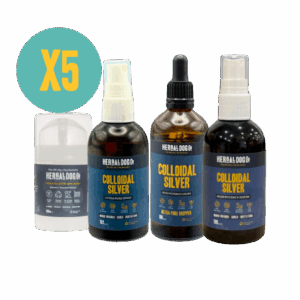Many things can go wrong with your dog’s gut. The most obvious and common are vomiting, diarrhoea, colitis or constipation. Luckily, there are almost as many herbs to help intestinal problems as there are issues, so it makes for fascinating research. If your dog has serious issues with these symptoms, or the problem drags on, it’s worth talking to your vet. Simple treatment usually sorts things out, but common digestive issues can be a sign of more significant disease.
How to stop sickness and diarrhoea in dogs
The best way to maintain healthy digestion is to maintain a healthy gut microbiome. As with humans, this is based on five key principles: healthy, species-appropriate diet, balanced exercise, reducing stress where possible, avoid avoidable antibiotics and using pre- and pro-biotics as necessary.
Why do dogs vomit
Vomiting is usually due to the dog eating something they oughtn’t. Vets call is dietary indiscretion. It will usually sort itself out with bland food for a few days and maybe a probiotic. Some dogs vomit first thing in the morning. This can be ‘bilious vomiting syndrome, BVS’. It sounds horrendous, but it’s not. The treatment for BVS is to feed a meal before bed at night to give the stomach something do. Try it. The results can be miraculous.
Dog Diarrhoea
Diarrhoea, where the stool becomes unformed, can be for many reasons. If it’s going on for a long time and is not diet responsive, herbs can be helpful. Chamomile, Matricaria recutita is known as ‘mother of the gut’. It can be used in almost all gut problems as its super-safe. Another herb to always have handy is Slippery Elm. It’s the powdered pinkish bark of the Ulmus rubra (red) tree. It’s a demulcent, a reliever of irritation of mucus membranes, and a pre-biotic because it contains indigestible sugars that the good gut bugs love.
Colitis in dogs
Colitis, where you see pain passing stool, blood or telltale mucus covering to the stool is really common. It’s usually after dietary indiscretion. But where the forbidden food hasn’t been vomited, and makes it all the way down to the other end of the gastro-intestinal tract, the colon (hence ‘col-itis’). Chamomile and Slippery Elm are really useful, but also think about Aloe Vera as a liquid or powder. It’s really calming to inflamed gut. Also, Marshmallow, Althea officinalis, a wonderful emollient (softener and healer of skin and mucus membrane) and demulcent. It can work wonders in all manner of inflamed gut problems.
Constipation in dogs
Constipation, where the dog is passing stool with difficulty, can be due to blockages and even enlarged prostate in entire male dogs, but it’s usually dietary: too much bone or too little plant fibre in the diet will do it. There is one herb that stands out, even more than those we’ve mentioned. It’s psyllium husk, from the hulls of seeds from the Plantago afra plant.
How to stop your dogs sickness and Diarrhoea
Psyllium (pronounced ‘silly-um’) works as a bulk laxative (filling out the stool to give the body something to push on). The mucilage in the seed husk absorbs large volumes of water from the gut, swells and becomes really slippery, helping things along. You can demonstrate this to yourself by putting a pinch of psyllium in your mouth. Within 30 seconds it softens and turns into what feels like wallpaper paste – great for helping a stubborn stool to pass more easily when used for constipation.
Our go to blends to help and maintain happy tums are;
https://herbaldogco.com/product/herbal-dog-co-all-natural-gut-health-support-supplement/




